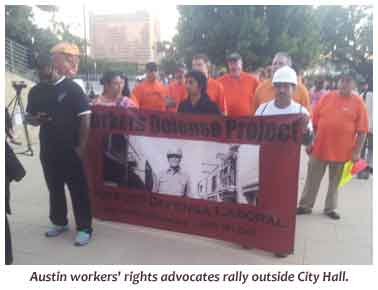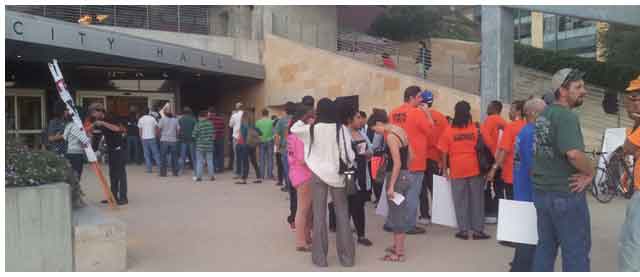 After years of pressing Austin leaders to approve a “living wage” law, workers' rights advocates celebrated the passage of a new set of requirements on companies that get tax breaks for relocating and building in the Texas capital. The city council late Thursday night voted 6-1 to demand that if a company gets a tax break for its project, it must pay the construction workers who build it at least $11 an hour or a “prevailing wage” if that's higher at the time of the construction. Of the more than 200 people who signed up to testify on the proposal, only 3 were against it.
After years of pressing Austin leaders to approve a “living wage” law, workers' rights advocates celebrated the passage of a new set of requirements on companies that get tax breaks for relocating and building in the Texas capital. The city council late Thursday night voted 6-1 to demand that if a company gets a tax break for its project, it must pay the construction workers who build it at least $11 an hour or a “prevailing wage” if that's higher at the time of the construction. Of the more than 200 people who signed up to testify on the proposal, only 3 were against it.
“What we’ve done over time is make economic incentives a right, not a privilege,” said Councilman Mike Martinez. “We need to make it a privilege, not a right,” he said, noting that Texas City already does something similar to what Austin will now do. He and others pointed out that it would be very difficult to argue that Texas City is somehow hostile to business. That coastal city in Galveston County is a petrochemical center and home to some of the biggest refineries in the state.
Despite that, Mayor Lee Leffingwell cast the lone “no” vote against the proposal. “This will cost us jobs,” Leffingwell said. To that, influential Austin political consultant David Butts – who rarely speaks at city council – said “There’s a lot of money being made, and they’re not willing to share it, even with the people who helped them earn it.”
Under the new law, companies applying for economic incentives would have to pay what's called a “prevailing wage” at times when that would be higher than the “living wage”. Workers must also be covered by workers' comp and receive safety training. All of these requirements, of course, would be a non-issue if a company decides it doesn't want to seek a tax break to move to Austin.
Greg Casar of the Austin-based Workers Defense Project testified that the only thing that changes when these laws are enacted is the treatment of construction workers. He said that companies in some other cities have had to reevaluate their business models, but they don't actually lose any money overall on the projects when they pay a better wage. He pointed out that Apple is already paying $11 per hour to construction workers building the company's new campus in north Austin.
One man who testified in favor of the new requirements pointed out that better-paid construction workers are generally better trained and therefore build projects that are more sound. Paying them prevailing wages will “ensure that construction in the city is of the quality that will last.”

Austin Demands Higher Wages on Projects That Get Incentives
by Scott Braddock | October 25, 2013



Add new comment